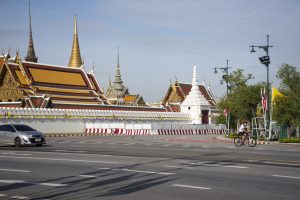Thailand will allow quarantine-free entry for fully-vaccinated travelers from low risk countries from the beginning of next month, the country’s prime minister announced yesterday, marking another step forward in the revival of one of the country’s most important industries.
In a televised speech, Prayut Chan-o-cha said that arrivals from at least 10 low-risk countries, including United Kingdom, United States, Singapore, Germany, and China, would be allowed to enter Thailand by air with no quarantine requirements, according to the Associated Press.
“The time has come for us to ready ourselves to face the coronavirus and live with it as with other endemic infections and diseases, much as we have learnt to live with other diseases with treatments and vaccinations,” Prayut said.
The measure has yet to be officially approved. The Thai leader said that he had ordered the country’s Ministry of Public Health and Center for COVID-19 Situation Administration to urgently consider the plan by the end of the week and to finalize the list of countries whose nationals will be exempted from quarantine.
According to Prayut, visitors from the selected nations will need to show negative test results before arriving in Thailand, whereupon they will be required to return another negative test. After that, they will be free to travel about the country. Visitors from all other countries will still have to meet the existing quarantine requirements, and Prayut pledged that the no-quarantine list would be expanded on December 1, and then again on January 1.
“I know that such decision has risk and it is almost certain that the daily number of COVID cases will increase once we begin to relax measures but we will closely monitor the situation,” Prayut said. “This is the high season and we cannot miss this opportunity.”
The plan, which would see foreigners travel to Thailand quarantine-free for the first time in 18 months, accelerates the timetable for opening up Thailand to foreign visitors. Under the existing timetable, the government planned to open only the capital Bangkok and a handful of provinces, including Chonburi, Phetchaburi, and Prachuap Khiri Khan in the south and Chiang Mai in the north, for foreign tourists on November 1. Following Prayut’s announcement, that reopening will now cover all parts of the country.
The plan marks a further step forward in the revival of Thailand’s economically pivotal tourism industry, which came to a near-total halt with the onset of the pandemic and the resulting restrictions on international travel in early 2020. While Thailand managed to contain COVID-19 with relative success for the first year of the pandemic, a third wave driven by the infectious Delta variant wiped out that progress in a matter of weeks and prolonged the country’s economic recovery. More than 98 percent of the country’s 1.7 million confirmed cases and 17,751 deaths have occurred since the beginning of the third wave in April.
The recent outbreaks have hampered the government’s planned reopening of tourism. So, too, has the country’s delayed national vaccination campaign, whose manifold problems have drawn political fire from the political opposition and the political movement that continues to mount street protests against Prayut’s government.
Against this backdrop, given the importance of tourism to the Thai economy – the country was attracting nearly 40 million foreign tourists per year – it is clearly a political priority for the Prayut administration, even at the risk of a possible further spike in COVID-19 cases. Last year, Thailand’s successes in containing COVID-19 came at a steep price, with the country experiencing the second-worst recession of the 10 nations in the Association of Southeast Asian Nations in 2020, with the Asian Development Bank reporting that its economy contracted by 6.1 percent.
According to Prayut, the removal of quarantine requirements is part of a broader package of loosening, which could include again permitting the consumption of alcohol beverages in restaurants as well as the operation of entertainment venues from the start of December, in time for the annual New Year holiday.
“We will have to track the situation very carefully, and see how to contain and live with that situation because I do not think that the many millions who depend on the income generated by the travel, leisure, and entertainment sector can possibly afford the devastating blow of a second lost New Year holiday period,” he said.
With vaccination rates remaining on the lower end of the Asian mean – Thailand has now fully vaccinated just a third of its population, and partially vaccinated half, according to Our World In Data – the question is less whether the opening will lead to the further spread of COVID-19 than how serious its impact will be.

































